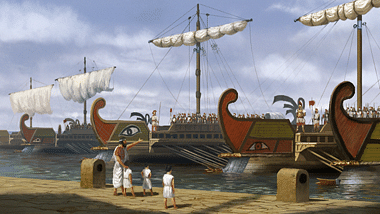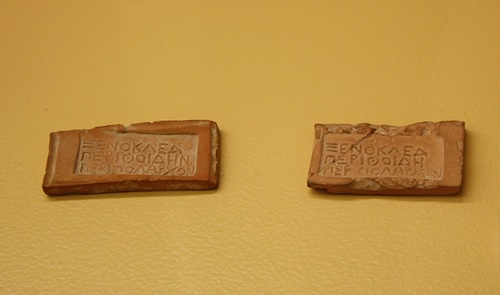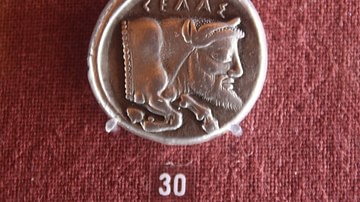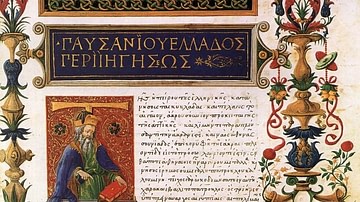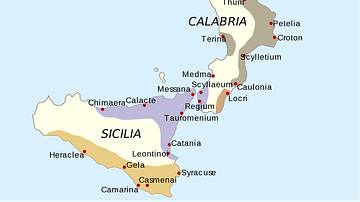Travel opportunities within the ancient Greek world largely depended on status and profession; nevertheless, a significant proportion of the population could, and did, travel across the Mediterranean to sell their wares, skills, go on religious pilgrimage, see sporting events or even travel simply for the pleasure of seeing the magnificent sights of the ancient world. Travel was not always glamorous, though, and three other significant groups who also travelled far from their homeland, usually against their will, were political envoys, slaves, and soldiers, especially mercenaries.
Celebrating Travel
Travel seems to have always been held in high regard by the Greeks, which is no surprise for a civilization famous for its curiosity and innovation. In the earliest oral traditions of Greek mythology, many of the tales, such as Jason and the Golden Fleece, celebrated the benefits to be gained from travelling whilst others, such as the myth of Charybdis, warned of the possible risks of voyaging into the unknown. In the earliest works of Greek literature in the 8th century BCE, both Homer and Hesiod describe traders, in particular, as great travellers. Works such as the Odyssey illustrated that the authors themselves had clearly travelled or at least spoken to those who had, and one might say that Odysseus' epic journey home to Ithaca was itself a celebration of the adventures inherent in travel.
The idea that the Greeks did travel widely is evidenced in the archaeological record which shows such tangible and measurable indicators of contact between peoples as finds of trade goods and coinage, uniformity in artistic styles and cultural practices, and the spread of disease. Literature too, for example, scholarly works, plays, and histories, all indicate that at least some portion of the population was relatively mobile across the Greek world. In addition, trends came back the other direction and new ideas could influence the home cities and regions; one important example of this two-way exchange was the influence of eastern tastes in clothes, food, and architecture on Greek city-life.
As the following quote from Plato's Crito illustrates, travel was widely considered a useful activity, and the Athenian philosopher Socrates is here criticised for not thinking so:
You never went out from the city to a festival, or anywhere else, except on military service, and you never made any other journey, as other people do and you had no wish to know any other city or other law, but you were contented with us and our city. (52b)
Practicalities
Travel on land meant using carriages and horses for the better off or beasts of burden and plain old walking for everybody else. Greece had an extensive road network connecting even the most remote settlements; however, the easiest and most comfortable way to travel was by sea, especially as the vast majority of the more important urban centres were located either on or very near the coast. There were no ships dedicated only for travellers, though, and the would-be tourist had to persuade a sea-trader to make room amongst his cargo.
Maps, at least those covering larger areas, seem to have been the reserve of scholars rather than everyday travellers. No doubt primitive roads, natural landmarks (mountains, rivers and springs) and settlements were used to guide a visitor new to a particular area. Regarding sea travel, ship's captains commonly kept logs (periploi) describing landmarks along coastlines and sometimes even records of land distances and routes (stadiasmoi) relevant to their ports of call.
Travel could be an expensive business, though, and if undertaken over long distances, required baggage porters and other attendants. Hospitality was usually provided by social peers for free (at least for the higher classes) but there were specific enterprises set up to provide basic food and accommodation, especially in the larger cities and great 'attractions' of the Panhellenic religious sanctuaries. At ports like the Piraeus, secondary businesses also sprang up to capture the money of the passing traveller, for example, shops, laundries, barbers and prostitutes.
The dangers of travel in the Archaic period included the legal problem of being in the territory of another state without permission whilst trying to arrive at one's destination, unreliable transport, robbery and even abduction; the latter two were a particular danger when travelling by sea, where pirates operated. By the Classical period relations between states became more regularised and systems of communication improved, but travel remained a risky business. In addition, with the ever-increasing size and complexity of urban-centres, the need for resources, skills and slaves meant that warfare could very often result in the forced movement of people and even whole populations.
Commercial Travellers
Traders (emporos), highly skilled craftsmen (especially metalworkers, gem-carvers, potters, stonemasons and glassworkers) and technical experts such as actors, writers, philosophers, and practitioners of medicine, commonly travelled around the Mediterranean offering their goods and services to those who could pay. Examples include the doctors Demokedes of Kroton and Apollonides of Kos (who both served the Persian royal court), the architect Mandrokles of Samos and the sculptor Telephanes. Many of these specialists and artisans made permanent moves and set up their workshops to spread their knowledge and artistic styles far from their original place of invention.
Traders also gathered at the busy commercial centres like the Piraeus to sell their goods which would, in turn, travel across the Mediterranean. Colonists (apoikoi) established hundreds of new cities across the Mediterranean, and these were usually developed from basic trading posts. In addition, there were centres which were exclusively set up for the purposes of trade, for example, Naucratis on the Nile Delta and Al Mina in present-day southern Turkey. Consequently, in the summer season, traders continuously criss-crossed the Mediterranean in search of goods and business, and in so doing they provided a means for non-commercial travellers to reach far-flung destinations.
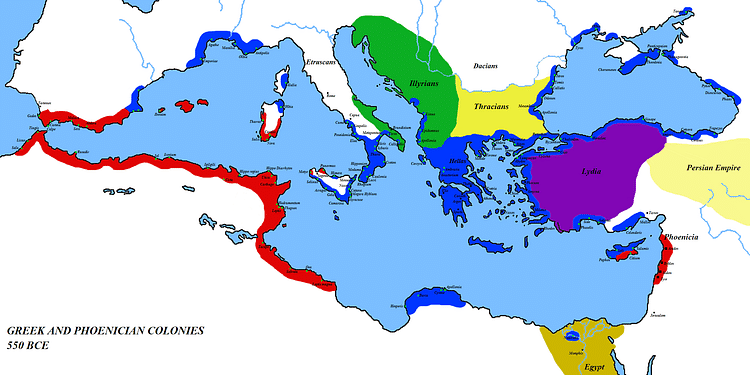
The Greeks, as with any other civilization, also had their share of that most intrepid of all travellers, the explorer. Perhaps motivated more by commercial opportunities rather than pure knowledge expansion, Greeks did occasionally go beyond the confines of the Mediterranean and explore the Atlantic coasts of Europe and Northern Africa. Perhaps the most famous explorers were Herodotus of Halikarnassos and Pytheas, who travelled as far as the south-west of England and possibly even made it to Iceland and the Baltic coast around 340 BCE.
Religious Travellers
Religious pilgrimages were also a common activity, the most popular destinations being the sanctuaries of Delphi and Delos. Here the visitors could not only admire some of the greatest buildings of Greek architecture but also great works of art in the form of statues, relief sculpture and fountains. They could leave dedicatory offerings of all kinds from simple clay figures to huge bronze statues or even entire buildings, offered in honour of the gods and usually in the hope of some kind of divine intervention in ordinary lives. Those seeking medical cures could also travel to centres such as Epidaurus where Asklepius, the god of medicine, could advise them on the best course of treatment. Also in the category of religious travel could be placed those who journeyed to see sites made famous by mythology such as caves where a god was said to have been born or a temple built where a god was said to have directly intervened in human affairs.
Festivals such as the Panathenaia and City Dionysia of Athens and those festivals which included the first showings of plays by the famous playwrights attracted visitors from far and wide. Indeed cities saw the financial and public relations benefits of welcoming visitors, for as the Athenian statesman Pericles stated in his famous funeral oration:
We throw open our city to the world, and never by alien acts exclude foreigners from any opportunity of learning or observing... (Boys-Stones, 394).
Travelling For Culture
Sports fans were also great travellers, especially those who wished to see the great athletic events of the Panhellenic games at Olympia, Delphi, Isthmia and Nemea. Due to the sacred nature of these games there was even a period of truce declared across Greece to allow safe travel for those who wished to attend.
Just as people travelled from rural areas to participate in life in the city and the opportunities offered there, people also travelled for their education to famous centres such as Plato's Academy in Athens or the scientific schools in Asia Minor, a phenomenon which only increased in Hellenistic times and expanded to artistic schools of drama and sculpture, for example. Similarly, scholars and sophists travelled around to find students or people willing to pay in order to learn such skills as music, philosophy, or public speaking.
Tourists were those who travelled for no other reason than to see for themselves the cultural sights made famous by literature, theatre, story-telling, warfare and even coinage. Especially popular were the large urban centres such as Athens and Sparta and Egypt, too, with its impressive ancient monuments. As one 5th century BCE comic poet put it:
If you've never seen Athens, your brain's a morass
If you've seen it and weren't entranced, you're an ass,
If you left without regrets, your head's solid brass!
(Boys-Stones, 395)
By the 3rd century BCE, literature, too, sprang up which described the great sights to be seen, with some of the earliest texts being On the Cities in Greece (of which only fragments survive) by Heraclides Criticus and the Epidēmiai by the poet Ion of Chios, one of the most celebrated travellers of the 5th century BCE. These texts usually restricted themselves to descriptions of famous works of art and monuments, rarely mentioning topography and never the practicalities of travel. They could also be highly selective, subjective and even prone to exaggeration but they do, nevertheless, illustrate the thirst amongst the Greeks to know more about the wider world.
Travel in the Greek world, then, just as today, was considered an important way to broaden the mind, learn about other, older civilizations or contemporary cultures and see for oneself the places made so famous by literature; to finally see first-hand the exciting and exotic places one has read and heard so much about since childhood.
